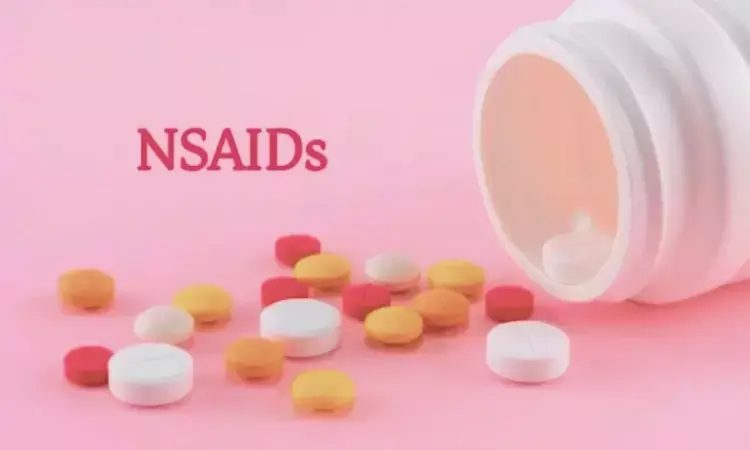- Home
- Medical news & Guidelines
- Anesthesiology
- Cardiology and CTVS
- Critical Care
- Dentistry
- Dermatology
- Diabetes and Endocrinology
- ENT
- Gastroenterology
- Medicine
- Nephrology
- Neurology
- Obstretics-Gynaecology
- Oncology
- Ophthalmology
- Orthopaedics
- Pediatrics-Neonatology
- Psychiatry
- Pulmonology
- Radiology
- Surgery
- Urology
- Laboratory Medicine
- Diet
- Nursing
- Paramedical
- Physiotherapy
- Health news
- Fact Check
- Bone Health Fact Check
- Brain Health Fact Check
- Cancer Related Fact Check
- Child Care Fact Check
- Dental and oral health fact check
- Diabetes and metabolic health fact check
- Diet and Nutrition Fact Check
- Eye and ENT Care Fact Check
- Fitness fact check
- Gut health fact check
- Heart health fact check
- Kidney health fact check
- Medical education fact check
- Men's health fact check
- Respiratory fact check
- Skin and hair care fact check
- Vaccine and Immunization fact check
- Women's health fact check
- AYUSH
- State News
- Andaman and Nicobar Islands
- Andhra Pradesh
- Arunachal Pradesh
- Assam
- Bihar
- Chandigarh
- Chattisgarh
- Dadra and Nagar Haveli
- Daman and Diu
- Delhi
- Goa
- Gujarat
- Haryana
- Himachal Pradesh
- Jammu & Kashmir
- Jharkhand
- Karnataka
- Kerala
- Ladakh
- Lakshadweep
- Madhya Pradesh
- Maharashtra
- Manipur
- Meghalaya
- Mizoram
- Nagaland
- Odisha
- Puducherry
- Punjab
- Rajasthan
- Sikkim
- Tamil Nadu
- Telangana
- Tripura
- Uttar Pradesh
- Uttrakhand
- West Bengal
- Medical Education
- Industry
NSAIDs Unlikely to Cause AKI After Urinary Surgery in Children, Study Finds

USA: In a recent study published in the Journal of Pediatric Urology, researchers found that postoperative use of non-steroidal anti-inflammatory drugs (NSAIDs) was unlikely to be a primary cause of acute kidney injury (AKI).cute kidney injury
Nonetheless, AKI remained a notable risk following lower urinary tract reconstruction surgeries. This risk is attributed to factors such as underlying health conditions, prolonged duration of surgeries, and significant fluid shifts during the procedure.
"There was no significant difference in the incidence of postoperative AKI between patients who received NSAIDs and those who did not follow lower urinary tract reconstruction, except for individuals with advanced chronic kidney disease (CKD)," the researchers reported.
The opioid crisis has prompted a shift towards greater use of non-opioid analgesics for postoperative pain management. Despite this trend, some pediatric urologists remain hesitant to prescribe NSAIDs due to concerns about potential AKI. Although earlier research has established the safety and effectiveness of NSAIDs in pediatric patients, their safety profile, specifically after lower urinary tract reconstruction procedures has not been thoroughly examined.
Against the above background, Darren Ha, Department of Pediatric Urology, Children's Hospital Colorado, Aurora, CO, USA, and colleagues hypothesized there would be a difference in the incidence of postoperative AKI between patients who did and did not receive NSAIDs following surgery. For this purpose, they used the Kidney Disease: Improving Global Outcomes (KDIGO) criteria for AKI (increase in creatinine ≥0.3 mg/dL or increase in creatinine ≥1.5x baseline or urine output <0.5 mL/kg/hr for six h).
A retrospective review was conducted on patients aged 2 to 18 who underwent lower urinary tract reconstruction procedures—such as bladder augmentation or creation of a catheterizable channel—between 2009 and 2021 and who had documented urine output.
The stage of CKD was evaluated using creatinine and cystatin C levels obtained within six months of surgery, based on the CKiD U25 equations. Patients who received NSAIDs were matched with those who did not, based on 11 characteristics, to evaluate differences in outcomes. The primary focus of the study was the incidence of AKI occurring within 48 hours post-surgery.
The study led to the following findings:
- The unmatched cohorts included 243 patients. Propensity matching identified 166 patients in the NSAID arm and 41 in the no NSAID arm. Twenty-six patients with CKD stage 2–3 were included.
- There was no significant difference in the incidence of postoperative AKI based on any KDIGO criteria (17.1% no NSAID versus 16.3% NSAID).
- Median postoperative opioids fell from 0.88 mg/kg in the no NSAID arm to 0.37 mg/kg morphine equivalents in the NSAID arm, although this was not statistically significant.
- Log-rank testing by Kaplan–Meier analysis demonstrated no difference in time to incidence of low urine output between the groups.
- In the whole population not stratified by NSAID use, there were no differences in AKI between those with and without CKD (16.7% with versus 17.9% without CKD).
"Our findings reinforce the safety and effectiveness of NSAIDs as a viable alternative to opioid analgesics for postoperative pain management. However, acute kidney injury continued to pose a significant risk following these surgeries, independent of NSAID use, likely due to factors such as underlying health conditions, extended surgery durations, and fluid shifts," the researchers wrote.
"Therefore, enhanced monitoring of patients is essential to mitigate the risk of postoperative complications," they concluded.
Reference:
Ha, D., Halstead, N. V., Blanchette, E. D., Wilcox, D. T., Vemulakonda, V. M., Wood, D. N., & Rove, K. O. (2024). Risk of acute kidney injury after lower urinary tract reconstruction with early NSAID therapy: A propensity matched retrospective analysis. Journal of Pediatric Urology. https://doi.org/10.1016/j.jpurol.2024.07.005
Dr Kamal Kant Kohli-MBBS, DTCD- a chest specialist with more than 30 years of practice and a flair for writing clinical articles, Dr Kamal Kant Kohli joined Medical Dialogues as a Chief Editor of Medical News. Besides writing articles, as an editor, he proofreads and verifies all the medical content published on Medical Dialogues including those coming from journals, studies,medical conferences,guidelines etc. Email: drkohli@medicaldialogues.in. Contact no. 011-43720751


